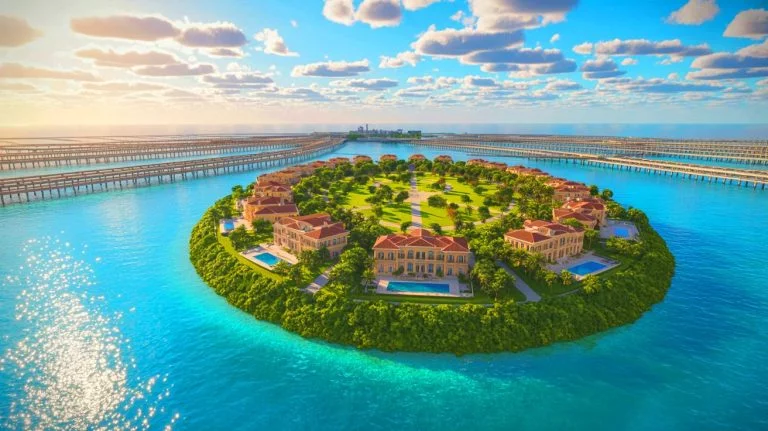| IN A NUTSHELL |
|
On the ultra-exclusive Indian Creek Island near Miami, home to notable figures such as Jeff Bezos and Tom Brady, an unexpected conflict has arisen: that of sewage management. Despite the island’s status as a haven for the elite, it lacks a fundamental necessity—a waste treatment facility. Instead, the island seeks to redirect its waste to a neighboring community, sparking a contentious debate over fairness and infrastructure responsibilities. This dilemma highlights the growing tension between wealth and community obligations, raising questions about privilege and public service access.
An Island of Billionaires Without a Sewage System
Indian Creek Island, often dubbed the “billionaire bunker,” is an artificial island hosting some of the world’s most substantial fortunes. With only about 40 luxurious residences, one might assume that the island is equipped with state-of-the-art infrastructure. However, it lacks a crucial component: a sewage treatment system. This gap in infrastructure has led local authorities to propose a straightforward yet controversial solution. They suggest channeling waste through the pipelines of the nearby city of Surfside.
This suggestion has not gone unnoticed. The plan has sparked debate over resource allocation and fairness. Indian Creek, despite its wealth, has not invested in its own waste management facilities. Instead, it seeks to rely on its neighbors. This raises important questions about community responsibility and the role of wealth in public service negotiation.
Surfside Says No Without $10 Million
The city of Surfside has reacted swiftly to Indian Creek’s proposal. While they are open to taking on the island’s sewage, they have set a condition: Indian Creek must pay $10 million. Surfside officials argue that the fee is justified. It reflects the historical costs of maintaining and modernizing their own sewage system, including a $30 million debt from recent renovations.
Surfside’s stance highlights a broader issue of financial responsibility. The city does not want the nation’s wealthiest individuals to benefit from a service that its own residents have funded over decades. This insistence on compensation underscores the importance of equitable contributions to shared resources. Surfside’s response is a stand for fiscal justice, emphasizing that wealth should not exempt anyone from community obligations.
Billionaires Turn to Government and Win
Unwilling to foot the bill, Indian Creek residents turned to the Florida legislature. In a strategic move, they leveraged a recently passed infrastructure law. This law prohibits cities from blocking or charging for the extension of sewage pipelines. As a result, Indian Creek can now connect to Surfside’s system free of charge, despite local opposition.
This legislative victory has drawn sharp criticism. Many see it as a blatant example of privilege, where a wealthy minority sidesteps paying for public services, shifting the burden onto others. The situation underscores tensions between ultra-wealthy individuals and local communities, particularly in areas with pronounced inequality. The decision raises pivotal questions about governance and the influence of wealth on legislative processes.
Implications for Fiscal and Environmental Justice
The conflict between Indian Creek and Surfside is emblematic of broader debates on fiscal and environmental justice in the United States. The situation highlights the fractures between affluent enclaves and the communities that surround them. It serves as a reminder of the ongoing struggle for equitable resource distribution and accountability.
As debates about environmental justice gain traction, the Indian Creek case offers a poignant example of these issues in action. It challenges the notion of solidarity within localities, demonstrating how wealth can disrupt community dynamics. The case prompts reflection on the responsibilities of the affluent in contributing to public goods and services.
The story of Indian Creek and Surfside raises significant questions about the balance of wealth and community responsibility. As cities and towns across the nation grapple with similar issues, how can we ensure that all members of a community contribute fairly to shared resources? What mechanisms can be put in place to prevent privilege from undermining communal solidarity?
Did you like it? 4.4/5 (30)








Why do the wealthy always seem to find loopholes to avoid paying their fair share? 🤔
It’s absurd that billionaires can’t even manage their own waste. What happened to taking responsibility?
Thank you for shedding light on this issue. It’s important for us to be aware of these injustices.
Can Surfside legally stop this from happening? What are their options?
LOL, billionaires living in the lap of luxury but can’t handle their own poop! 😂
How does the new legislation even make sense? Seems like it only benefits the rich.